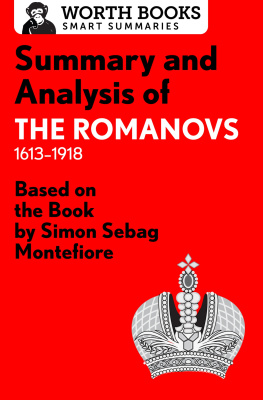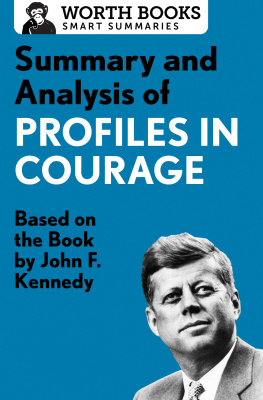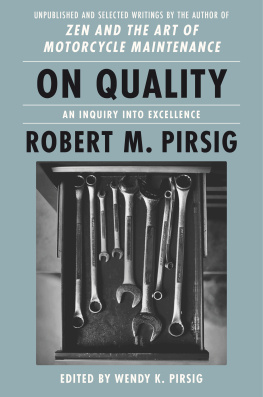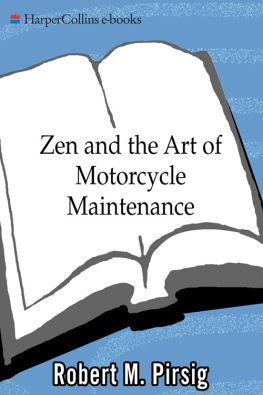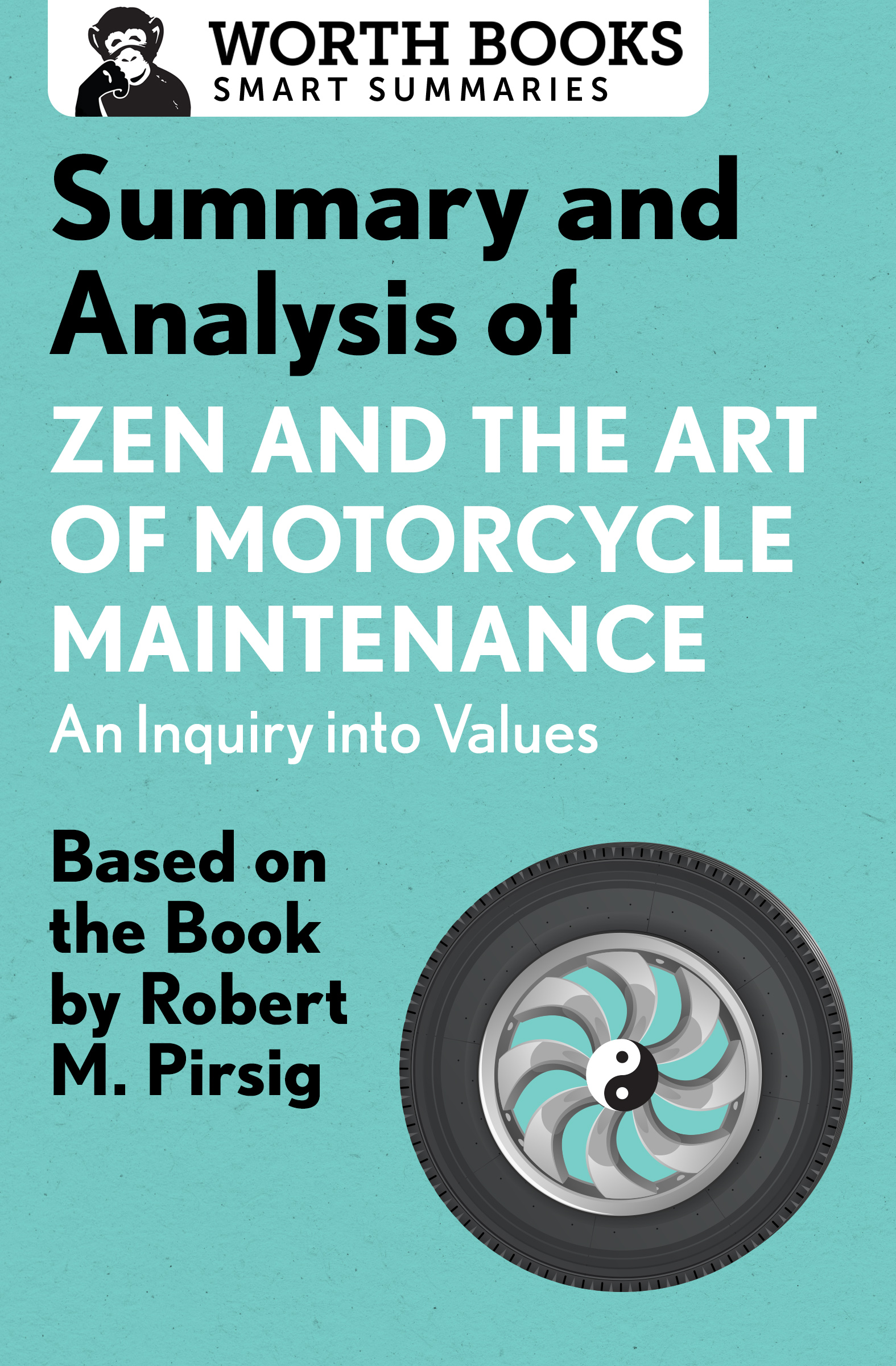Summary and Analysis of
Zen and the Art of Motorcycle Maintenance
An Inquiry into Values
Based on the Book by Robert M. Pirsig

Contents
Context
Zen and the Art of Motorcycle Maintenance by Robert M. Pirsig is often called an unclassifiable book. Is it a novel? Narrative nonfiction? Philosophy? In fact, it is unquestionably all three. Born from a motorcycle trip the author took with his son and some close friends in 1968, the book evolved from a series of essays, a bit of memoir, and a creative juxtaposition of ideas and metaphors. It grew from what Pirsig saw as modern societys deep malaise as technology exerts more and more influence over our lives.
When the book was first published, it was both lauded and panned by critics, and many readers did not know how to perceive it because it asked one of lifes most difficult questions: How do we know what is true and what is not? Written in an era when truths were being questioned, the establishment was anathema to many. The power of this book lies in its ability to make the reader think about the underlying structure of reality itself.
Since its first publication, the book has sold more than five million copies in twenty-three languages and has attained recognition as a modern classic. Praised by the BBC and The Telegraph , the press called it the most widely read philosophy book, ever.
Overview
Zen and the Art of Motorcycle Maintenance juxtaposes two parallel stories using a philosophical meditation as the mortar between them. The first story tells of the narrators motorcycle journey from Minnesota to California with his eleven-year-old son, Chris, and two close friends. The second story describes the life of a man the narrator calls Phaedrus, an intellectual genius who becomes obsessed with a philosophical concept he calls Quality.
As the group travels, the narrator intersperses the parallel plots with philosophical discourses he calls Chautauquas (named after traveling education and entertainment tent-shows popular at the turn of the twentieth century). Pirsigs Chautauquas begin with the narrator discussing his friendsJohn and Sylviaand their aversion to the technology that pervades the modern world. He calls this the romantic view. His own view is what he calls the classical, a pragmatic, analytical approach that includes a zeal for motorcycle maintenance. He also experiences strange memories of places on the trip, as if hes been there before.
As the story unfolds, the narrator reveals that Phaedrus is, in fact, the narrators previous persona, an alter ego destroyed by electroshock therapy after a nervous breakdown. The electroshock treatments all but destroyed the Phaedrus personality. The strange memories are fragments of Phaedruss recollections.
The narrator relates Phaedruss life from journal writings. Phaedrus was a child prodigy, a hyperintellectual genius who entered college at the age of fifteen but quickly grew disgusted with the scientific method, feeling it raised more questions than it answered. Years later, he earned a degree in English and found work teaching composition and rhetoric at Montana State University (MSU) in Bozeman. Phaedruss mind was like a pit bull: Once it got its teeth into something, it was incapable of letting go.
It was at MSU that he became fixated on the question of Quality. Ultimately, his quest to find the meaning of Quality would define Phaedruss life and eventual downfall. He finally realized that Quality is neither subjective nor objective, romantic nor classical. It is the bridge between these binaries.
On the road westward, the terrain and the travails of the trip mirror the narrators state of mind. His son Chris exhibits signs of mental illness and psychosomatic stomachaches. The most difficult external circumstances echo the most challenging intellectual mountains that Phaedrus had to climb. His Chautauqua topics include motorcycle maintenance in real life and as a metaphor for his approach to life; stuckness, which can lead to profound leaps of progress that take us out of the box of our everyday thinking; and how gumption can lead us to an awareness of Quality. It is the classical, dualistic thinking of the modern world that holds us back.
The narrator also explores a recurring dream with a glass door between him and Chris. He eventually realizes that the dream symbolizes the struggle between his identity and that of Phaedrus. He believes Phaedrus is reasserting himself.
Phaedrus enrolled in an interdisciplinary PhD program at the University of Chicago to satisfy his obsession with ancient Greek philosophy. He quickly clashed with the chairman of the interdisciplinary committee, whose classical ideas ran counter to Phaedruss ideas of Quality. It was this humiliating confrontation that caused Phaedruss mental breakdown, leading to the shock treatments that destroyed his identitybut not before he made the final connection hed been seeking.
The Quality he had been seeking for so long was nothing other than the Tao of Lao Tzu, the ancient Chinese wisdom from which all Eastern religions and philosophies sprang. Quality was the source from which both romanticism and classicism grew, not a result of either way of thinking. And it was ancient Greek philosophers such as Socrates, Plato, and Aristotle that destroyed this way of thinking in the West more than twenty-four centuries ago, crippling our ability to experience Quality.
By the time they reach San Francisco, Chris and the narrator reach a climax of conflict between them. Phaedrus was the boys father, not the narrator. The narrator fears that Chris might be slipping into the same kind of insanity as Phaedrus. The narrator wishes to send Chris home on a bus and then commit himself, explaining what happened when he broke down before. The glass-door dream was a real memory in the hospital where Phaedrus was taken away and Chris couldnt reach him. This realization sparks Phaedruss reawakening, merging his persona with the narrators once again.
Summary
PART I
The narrator and his son Chris are on a motorcycle trip across the Central and Great Plains, passing through Minnesota with friends John and Sylvia, who are on another motorcycle.
Traveling by motorcycle is completely different from traveling by car. On a bike, one becomes part of the landscape rather than viewing the world through a window. During this trip, the narrator wishes to offer the reader a series of Chautauquassimilar to the traveling educational assemblies that brought culture and entertainment to rural communities in the late nineteenth and early twentieth centuries.
His first Chautauqua is to lament modern humanitys dependence onand loathing oftechnology. Its a destructive love-hate relationship. John and Sylvia despise technology even as theyre addicted to it. There are instances of suppressed anger at the role technology plays in their lives, evidenced through anger at a leaky faucet and refusal to do their own motorcycle maintenance, but the narrator does not define them based solely on these feelings.
Need to Know: The narrators view of motorcycle maintenance differs diametrically from Johns view. The narrator does all maintenance himselfhe knows his bike inside and out; no one will ever approach it with the same care he does. John staunchly believes its better to take his bike to a dedicated mechanic. This difference will become a metaphor for their approaches to life.
The narrator, Chris, John, and Sylvia see a storm on the horizon as they approach the Dakotas.


